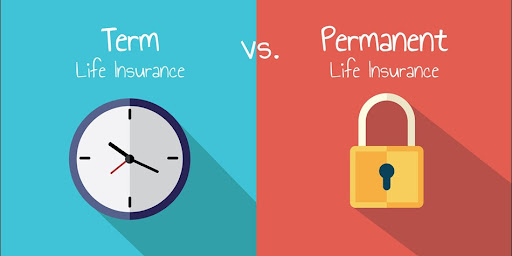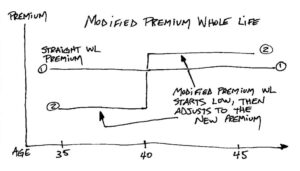The type of life insurance policy that generates immediate cash value is a whole life insurance policy. This policy allows the policyholder to accumulate cash value that can be accessed during their lifetime.
Life insurance is an essential financial tool that can provide protection and financial security for your loved ones. There are various types of life insurance policies available, each with its own unique features and benefits. One popular option is whole life insurance, which not only provides a death benefit but also accumulates cash value over time.
This cash value can be accessed by the policyholder during their lifetime, providing a source of immediate liquidity if needed. Understanding the different types of life insurance policies and their respective cash value accumulation can help you make an informed decision about the best option for your financial needs.

Credit: wealthnation.io
Understanding Life Insurance Policies
Life insurance provides financial security for your loved ones and there are different types of policies available. Understanding the differences between various life insurance policies can help you make an informed decision that suits your needs. Let’s delve into the three main types of life insurance policies: Term Life Insurance, Whole Life Insurance, and Universal Life Insurance.
Term Life Insurance
Term life insurance provides coverage for a specific period, such as 10, 20, or 30 years. It offers a death benefit to the beneficiaries if the insured passes away during the policy term. While term life insurance doesn’t accumulate cash value, it is often more affordable than other types of life insurance and can provide valuable protection during the chosen term.
Whole Life Insurance
Whole life insurance provides coverage for your entire life, offering a guaranteed death benefit as well as a cash value component that accumulates over time. The cash value grows at a guaranteed rate and can be accessed through loans or withdrawals, providing a source of immediate cash value for the policyholder. Whole life insurance offers financial protection and the potential for long-term cash accumulation.
Universal Life Insurance
Universal life insurance combines a death benefit with a cash value component and provides flexibility in premium payments and death benefits. It offers an opportunity for cash value growth based on market interest rates, with the potential for higher returns compared to other types of life insurance. Universal life insurance allows policyholders to adjust their coverage and premiums as their needs change, providing a level of flexibility.

Credit: www.apexlifesettlements.com
Importance Of Cash Value In Life Insurance
Life insurance policies provide financial security for your loved ones in the event of your passing. However, not all life insurance policies are created equal. A key feature to consider when selecting a policy is the cash value it generates. Understanding the importance of cash value in life insurance can help you make informed decisions to protect your family’s future.
What Is Cash Value?
Cash value is a feature of permanent life insurance policies, such as whole life and universal life insurance. It refers to the accumulating funds within the policy over time, which can be accessed during the policyholder’s lifetime. The cash value grows tax-deferred and can be used for various financial needs, such as supplementing retirement income, covering emergency expenses, or taking out a loan against the policy.
Benefits Of Having Cash Value In Life Insurance
- Financial Flexibility: Cash value provides a safety net, allowing policyholders to access funds in times of need without surrendering the policy.
- Tax Advantages: The growth of the cash value is tax-deferred, meaning the funds can grow faster than in a taxable account.
- Legacy Planning: Policyholders can use the cash value to leave a financial legacy for their beneficiaries or as an inheritance to loved ones.
- Loan Facilities: Some policies allow withdrawal or borrowing against the cash value, offering a source of immediate funds in emergencies.
- Accumulation of Wealth: Over time, the cash value can become a significant asset, providing a form of savings and investment within the insurance policy.
- Stable Asset Growth: The cash value generally grows at a guaranteed minimum rate, providing a stable asset growth component to the policy.
Life Insurance Policies With Immediate Cash Value
Life insurance policies with immediate cash value can be a smart financial choice for individuals seeking both protection for their loved ones and a savings component. These policies provide the dual benefit of a death benefit and the potential for immediate cash value accumulation. When it comes to life insurance policies with immediate cash value, two popular options are whole life insurance and universal life insurance.
Whole Life Insurance
Whole life insurance is a type of permanent life insurance that provides coverage for the entire lifetime of the insured individual. With whole life insurance, your beneficiaries are guaranteed a death benefit upon your passing. But what sets whole life insurance apart from other policies is its potential to accumulate cash value over time.
The cash value in a whole life insurance policy grows tax-deferred, meaning you won’t have to pay taxes on the growth until you withdraw it. Additionally, some whole life policies offer dividend payments, which can further boost your cash value accumulation.
One of the key advantages of whole life insurance is its fixed premiums. Once you lock in your premium rate, it remains the same throughout your life, providing you with a predictable cost. This can be beneficial for budgeting purposes, and it ensures that your policy remains in force as long as you pay your premiums.
Universal Life Insurance
Universal life insurance is another type of permanent life insurance that offers a death benefit and the potential for cash value accumulation. Unlike whole life insurance, universal life insurance comes with flexibility and adjustable components.
With universal life insurance, you have the ability to adjust your premium payments and death benefit amount. This allows you to tailor your policy to your changing financial circumstances, making it a flexible option for individuals with evolving needs. Additionally, universal life insurance policies typically have a cash accumulation component that grows over time.
The cash value in a universal life insurance policy grows based on the performance of the policy’s underlying investments, such as stock market indexes or fixed interest rates. This means that the growth of your cash value is linked to market conditions and can vary over time.
It’s important to note that withdrawing or borrowing against the cash value of a universal life insurance policy may impact the death benefit or result in tax consequences, so it’s essential to carefully consider your options before making any decisions.
Comparing Whole Life And Universal Life Insurance
Comparing the benefits of Whole Life and Universal Life Insurance, the latter policy generates immediate cash value for policyholders. It offers flexibility and potential growth, providing a reliable financial resource when needed.
When choosing a life insurance policy that generates immediate cash value, it’s crucial to understand the differences between whole life insurance and universal life insurance. Both of these policies offer the benefit of cash value growth, but they have distinctive features and benefits. Let’s compare the two to help you make an informed decision.
Features And Benefits
Whole life insurance provides lifelong coverage with a fixed premium and death benefit. It offers guaranteed cash value growth and potential dividends. On the other hand, universal life insurance offers more flexibility with adjustable death benefits and premium payments. It also allows you to customize your policy according to your financial needs and goals.
Here’s a breakdown of the features and benefits of each type of insurance:
| Features | Whole Life Insurance | Universal Life Insurance |
|---|---|---|
| Coverage | Lifelong coverage | Lifelong coverage |
| Premiums | Fixed premiums | Flexible premiums |
| Death Benefit | Fixed death benefit | Adjustable death benefit |
As you can see, both policies offer lifelong coverage, so you can rest assured that your loved ones will be financially protected no matter when you pass away. However, whole life insurance comes with fixed premiums, providing stability and predictability to your financial planning. Universal life insurance, on the other hand, allows more flexibility by allowing you to adjust your premiums and death benefit as your financial situation changes.
Cash Value Growth
One of the key benefits of both whole life insurance and universal life insurance is the cash value growth. Let’s take a closer look at how the cash value grows over time:
- Whole Life Insurance
- The cash value of a whole life insurance policy grows consistently over time, following a predetermined interest rate set by the insurance company.
- This cash value can be accessed during your lifetime through policy loans or withdrawals, providing you with immediate cash when needed.
- Additionally, the cash value can increase through dividends, which are not guaranteed but can be used to enhance the cash value or accumulate interest.
- Universal Life Insurance
- The cash value of a universal life insurance policy also grows over time, but it’s influenced by the performance of the underlying investment options.
- With universal life insurance, you have the opportunity to invest the cash value in various investment options, such as stocks or bonds.
- This investment component can potentially result in greater cash value growth, but it also carries more risk compared to whole life insurance.
Understanding the cash value growth of both whole life insurance and universal life insurance can help you determine which policy aligns best with your financial goals. If you prioritize stability and guarantees, whole life insurance may be the right choice for you. On the other hand, if you’re comfortable with some investment risk and desire flexibility, universal life insurance might be more suitable.
Factors To Consider When Choosing A Life Insurance Policy
Choosing the right life insurance policy that suits your financial goals and provides immediate cash value can be a crucial decision. To make an informed choice, you need to consider various factors that play a significant role in determining the benefits you receive. These factors include cash value options, premiums, flexibility, and death benefits. Let’s delve deeper into each factor to help you understand their importance and make an informed decision.
Cash Value Options
When selecting a life insurance policy, it is essential to consider the cash value options it provides. Different types of policies offer distinct cash value accumulation methods. Some policies, such as whole life insurance, build cash value that grows with time and can be borrowed against or withdrawn. On the other hand, universal life insurance allows policyholders to adjust their premium payments and death benefit, providing greater flexibility in managing cash value accumulation. Analyzing the cash value options offered by various policies will help you find one that aligns with your financial goals and liquidity needs.
Premiums
The amount you pay as premiums for your life insurance policy is a crucial factor to consider. Premiums vary depending on factors such as your age, health condition, and the type of policy you choose. It is important to assess your budget and determine how much you can comfortably allocate towards paying premiums. Keep in mind that while some policies may have higher premiums, they often offer better cash value accumulation and more comprehensive coverage. Evaluating different policies and understanding their premium structures will help you choose a plan that strikes the right balance between cost and benefits.
Flexibility
Flexibility is another factor that deserves careful consideration when selecting a life insurance policy. Policies with flexible features allow you to adjust the death benefit, premiums, and cash value accumulation according to your changing financial circumstances. For instance, convertible term life insurance allows you to convert your term policy into a permanent one without undergoing a medical exam. This flexibility ensures that your life insurance coverage can adapt to your evolving needs and goals, providing greater financial security.
Death Benefit
In addition to considering cash value options, premiums, and flexibility, the death benefit offered by a life insurance policy is a critical factor. The death benefit is the amount your beneficiaries will receive upon your passing. It is crucial to determine the appropriate death benefit amount that adequately protects your loved ones from financial difficulties in your absence. Assessing your current financial obligations, future obligations, and income replacement needs will help you determine the optimal death benefit amount that ensures financial security for your family.

Credit: artlifeinsurance.com
Frequently Asked Questions On Which Type Of Life Insurance Policy Generates Immediate Cash Value
What Is A Life Insurance Policy That Generates Immediate Cash Value?
A life insurance policy that generates immediate cash value is a type of policy that allows you to build up cash value from day one. This means that a portion of your premium payments are set aside as cash value, which you can borrow against or withdraw if needed.
It provides both protection and a savings component.
How Does A Life Insurance Policy Generate Cash Value?
A life insurance policy generates cash value through a process called cash value accumulation. When you pay your premiums, a portion of the money goes towards the cost of insurance coverage, while the rest is invested by the insurance company.
Over time, the investment grows and accumulates as cash value, which you can access during your lifetime.
What Are The Advantages Of A Life Insurance Policy With Immediate Cash Value?
A life insurance policy with immediate cash value offers several advantages. Firstly, it provides financial protection to your loved ones in the event of your death. Secondly, it builds up cash value that you can use during your lifetime for things like emergencies or retirement.
Lastly, it offers potential tax advantages, as the growth of the cash value is tax-deferred.
Are There Any Drawbacks To A Life Insurance Policy With Immediate Cash Value?
While a life insurance policy with immediate cash value has its advantages, it also has some drawbacks. One potential drawback is the cost, as these policies tend to have higher premiums compared to other types of life insurance. Additionally, taking out loans or withdrawals from the cash value can reduce the death benefit, impacting the coverage for your beneficiaries.
Conclusion
Understanding the different types of life insurance policies is crucial when it comes to generating immediate cash value. Whole life insurance and universal life insurance are two popular options that offer this benefit. By carefully considering your needs and financial goals, you can choose a policy that not only provides protection but also allows you to build cash value over time.
It’s important to consult with a reputable insurance provider to find the best option for you.




